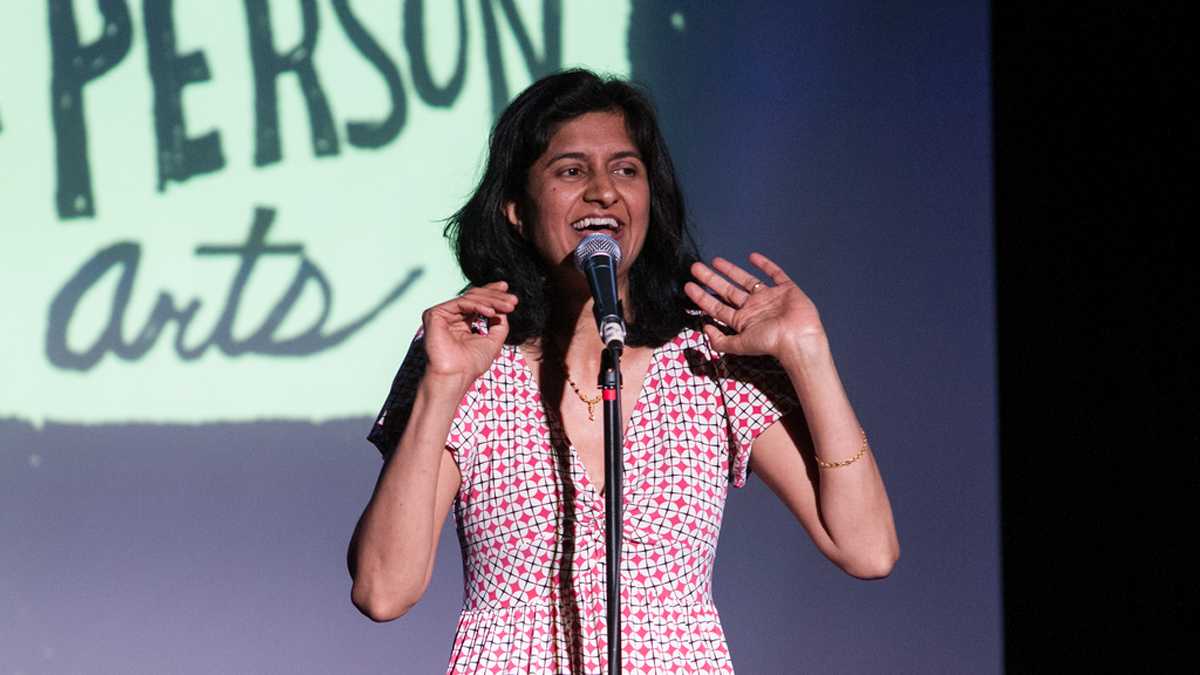On becoming American: ‘I am an illegal alien, and I am turning myself in.’
Listen
Nimisha Ladva at a Story Slam in April 2013. (Jen Cleary/for First Person Arts)
Immigrants face many challenges as they attempt to forge a new life in a new land. Nimisha Ladva recalls her family’s experience when they decided to seek permanent residence status, after arriving illegally in the U.S. nine years before.
“I’m in Los Angeles Federal Court. I am in the basement. And I am being arrested for the second time. I am an illegal alien, and I am turning myself in.”
So begins Nimisha Ladva’s story about her experience at age 21 when she and her family decided to seek permanent residence status in the United States, after arriving illegally nine years prior. She was recorded at the National Museum of American Jewish History’s “Freedom Seder Revisited,” co-presented with First Person Arts. Listen to the story above.
Immigrants face many challenges as they attempt to forge a new life in a new land. Nimisha is now a U.S. citizen and living in suburban Philadelphia. We asked her more about her harrowing experience at the mercy of U.S. Immigration Court.
When did you become a citizen?
I became a citizen in 1999 or 2000. I don’t have the exact date in front of me, but I know it was then, because Bush vs. Gore was the first election in which I voted.
How did the experience of your path to avoid deportation — and more widely, your path toward citizenship — affect your perception of the current political debate about immigration?
My path to citizenship continues to shape my ideas about immigration and my political opinions — but in ways that surprise me. For example, some of the people who supported my family’s path to citizenship were Republicans. This makes me aware that, while conversations about immigration take a partisan tone almost immediately, it doesn’t have to be this way. So while I am saddened by the current climate around discussions about immigration I’m also left feeling optimistic about America.
How important do you think it was to have those 30 people there in support of you? Do you think it swayed the judge’s opinion?
I think it did. That judge was quietly removed from the bench and had more than one story in the L.A. Times published about his bullying behavior. What made our case different was that we spoke English, we had an attorney, and we had support from a lot of varied U.S. citizens in the courtroom that day. All of this was insulting to the judge. But the presence of the people definitely made a difference. I remember him pointing to the crowd. He really didn’t know what to do with the spectacle of such support; it was clearly a completely novel experience for him. Lucky for us.
Do you have any connection with your attorney to this day?
I have been trying to find him so I can thank him — but he has retired from practice and apparently moved. So: Mr. Robert E. Coughlon, formerly of Moorpark, California — thank you. Thank you a million times!
What is the first thing you and your family did after the episode in the courtroom that day?
I remember the crying and hugging, of course, but I am blank about a specific action or event. What I will say is that, in the days immediately after, I walked around the world feeling physically different: I was actually standing up straighter, my back felt more relaxed, and I could think faster and more clearly. While I was, of course, aware of how stressful it was to be living in limbo, it was only after my case was resolved that I recognized the extent of the psychic and physical toll these circumstances had been having on me.
—
Nimisha Ladva is an award-winning writer and storyteller, and she is a visiting assistant professor of English at Haverford College. Her short stories have been published in the U.S. and U.K. In November 2014, she was the First Person Arts’ GrandSlam winner. Born in Kenya, raised in England, and educated in California, she now lives outside of Philadelphia.
First Person Arts is Philadelphia’s premiere storytelling organization and the presenters of twice-monthly StorySlams, the weekly First Person Arts Podcast, and the annual First Person Arts Festival. Founded in 2000, FPA believes that everyone has a story to tell, and that sharing our stories connects us with each other and the world. From such artistic luminaries as novelist Toni Morrison, activist Angela Davis, and celebrity chef Marcus Samuelsson, to emerging artists and everyday people, FPA presents a diverse array of storytellers to transform the drama of real life into memoir and documentary art.
WHYY is your source for fact-based, in-depth journalism and information. As a nonprofit organization, we rely on financial support from readers like you. Please give today.

